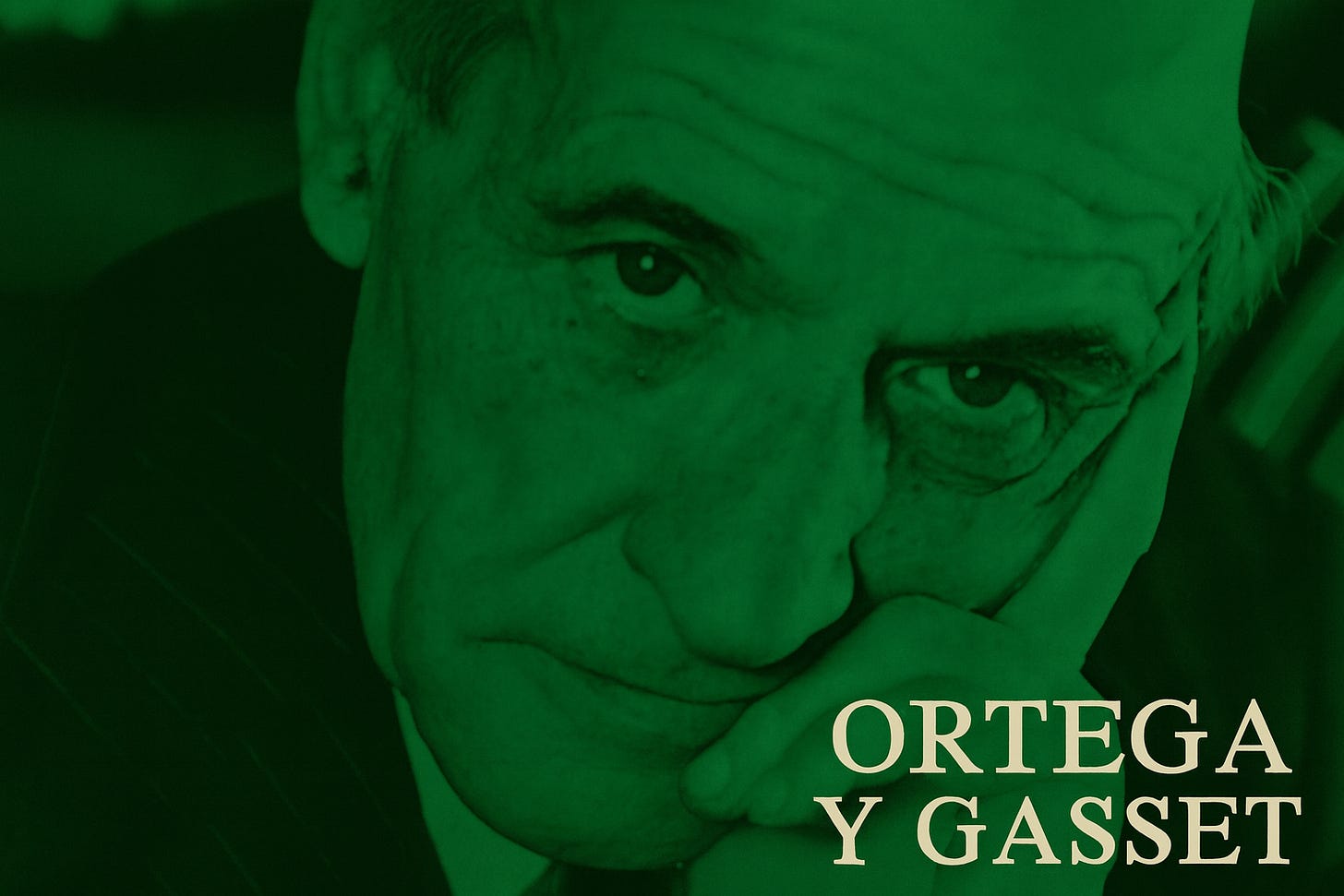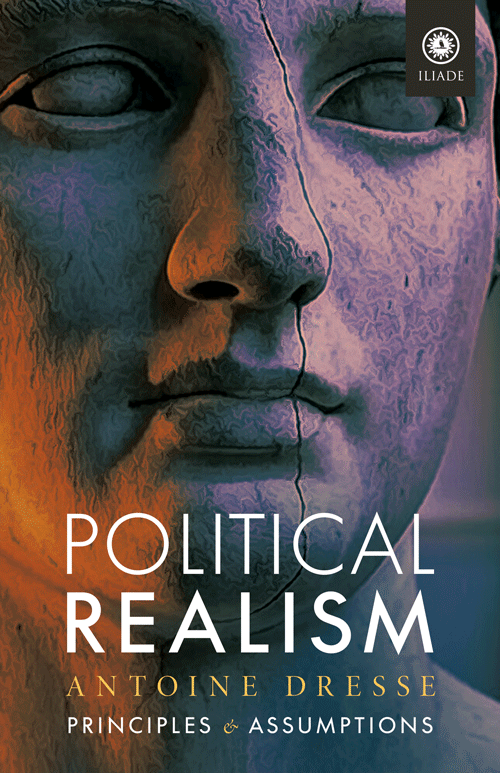José Ortega y Gasset: The Vertical Invasion of the Barbarians

Antoine Dresse (“Ego Non”) explains how José Ortega y Gasset saw the rise of the "mass-man"—an average, unqualified individual—as a threat to civilization. This figure, empowered by modern democracy and technology, displaces cultural elites while ignoring the foundations of the world he inherits. Ortega calls it a “vertical invasion of the barbarians.”
Mediocrity is no novelty in the history of humankind. It has always existed, here and there, across all layers of society. But the great novelty of our time “is that the mediocre soul, aware of its mediocrity, has the audacity to proclaim the rights of mediocrity and impose them everywhere.” That which is excellent, individual, qualified, and chosen tends to be replaced by the world of the masses. So wrote the Spanish philosopher José Ortega y Gasset in one of the 20th century’s greatest essays, The Revolt of the Masses. One instinctively knows one is encountering a classic work of thought when a book can be read many years after its publication without losing any of its freshness. And so it is with The Revolt of the Masses, nearly a century after its release, which has lost none of the power or originality of its message.
Published in Spain in 1929, Ortega’s book was written roughly a decade after the First World War and stands as a kind of meditation on the civilizational crisis that Europe was undergoing at the time. The first thing that strikes the observer of this crisis, he says, is what he calls the revolt of the masses—that is, “the rise of the masses to full social power.” This expression should not be taken in a strictly political sense, but rather as referring primarily to the intellectual, moral, economic, and even religious spheres, extending to ways of seeing, dressing, and enjoying life.
Society, he says, is always the dynamic unity of two elements: minorities (the elites) and the masses. The minorities are individuals or groups of individuals with special qualifications, whereas the mass is simply a set of unqualified persons. But it is important not to assign too narrow a meaning to the term “mass.” The mass Ortega speaks of is not the “working class” or the “common people.” The mass-elite opposition must not be understood in the Marxist sense of proletariat vs. bourgeoisie. Rather, the mass here refers to a type of human being which could include an uncultured banker, an ignorant industrialist, or even a brutish laborer; the mass consumes energy but produces none that is creative.
What we have witnessed in the 20th century, then, is the seizure of power by the mass. No longer a shapeless quantity molded by the elite, the mass now takes power as a mass. The mass, without ceasing to be a mass, begins to replace the elite. As Ortega notes: “The mass is the average man. Thus, what was once a mere quantity—the crowd—takes on a qualitative value: it becomes the common quality, that which belongs to everyone and to no one, man insofar as he does not distinguish himself from others, as a mere repetition of the generic type.” One of the defining traits of our time, then, is the dominance of the mass and the mediocre, even within groups where selection once prevailed. In intellectual life, for instance—which demands and presupposes the discernment of quality—Ortega already observed in the early 20th century the rising triumph of unqualified pseudo-intellectuals.
The mass has thus resolved to step into the foreground of society, and we are witnessing the triumph of a hyper-democracy in which the mass imposes its laws, its desires, and its tastes. But how did we get here? After all, the mass did not consciously decide to seize power. This kind of upheaval results from specific historical conditions; it is the outcome of the long maturation of democratic and egalitarian ideas on the one hand, and the incredible development of technology on the other. Let us see what Ortega means more concretely.
From the 6th century AD until the year 1800, Europe’s population never exceeded roughly 180 million. But from 1800 to 1914—that is, in just over a century—it grew from 180 million to 460 million! In three generations, he says, Europe produced “human dough” on a massive scale, to the point that its historical sphere was overwhelmed.
Yet, what is most striking is not simply the drastic increase in population, but the startling and dizzying contrast it reveals. This sudden surge means that enormous masses of people were thrust into history at a pace too fast to be fully integrated into Europe’s traditional culture. In a sense, the average European of the 20th century often gives the impression of a primitive man who has abruptly appeared in the middle of an ancient civilization.
The incredible improvement in living conditions allowed for an unprecedented population boom in Europe, but the intellectual dominance of egalitarian and liberal schools of thought—descended from the 18th century—failed to educate that population. Worse still, it inflated their pride and handed them the power of modern tools, but not the spirit that had presided over their creation. The new generations of Europeans, then, want nothing to do with the old spirit; they prepare to take control of the world as if it were a paradise without old traces, without traditional and complex problems.
Whereas the old world imposed its limits and pressures of every kind upon men, the world that surrounds modern man from birth does not compel him to restrain himself in any way. On the contrary, it fuels his appetites, which, in principle, can grow without end. “There are very few people who doubt that in five years’ time, cars will be more comfortable and cheaper than those being produced today,” Ortega wrote in 1929. This observation still holds true: without even thinking deeply about it, we are all fairly convinced that our computers and phones will be even more advanced in five or ten years. We believe this as surely as we believe in the next sunrise, he wrote, and the comparison is apt. Because the new average man—the mass-man—when faced with this technically perfect world, sees it almost as a product of nature, never reflecting on the genius-level effort required for its creation by elite minds. He struggles to admit that it rests on a few rare human qualities, any failure of which might destroy this magnificent structure.
This brings Ortega to what he identifies as the most striking psychological trait of the current mass-man: a fundamental ingratitude toward all that has made the ease of his existence possible. This trait, in fact, is the hallmark of the spoiled child. And it is perhaps the image that best defines the modern mass-man. “The ‘new average man,’ heir to a very ancient and brilliant past—brilliant in inspiration and effort—has been ‘spoiled’ by the world around him.” To spoil someone is to place no limits on their desires, to give them the impression that everything is permitted, that they are bound by no obligations. The creature raised under such conditions does not experience its own limitations. By shielding it from all external pressure, from all collisions with others, one ends up making it believe that it alone exists, accustoming it to disregard others—and above all, to never accept that anyone might be superior to it. This sense of another’s superiority could only be imparted by someone stronger, who forced it to give something up, to restrain itself, to exercise self-control.
Thus, says Ortega, we are witnessing “a vertical invasion of the barbarians.” This is a strong phrase, and what it means is that the man who dominates today is a primitive who has arisen in the midst of a civilized world. It is the world that is civilized—not its inhabitants, who do not even recognize civilization, but exploit it as though it were a product of nature itself. “The new man desires a car and enjoys it; but he believes it to be the spontaneous fruit of some Edenic tree.”
The modern mass-man is, indeed, a primitive who has slipped in through the back door onto the old stage of European civilization, benefiting from the entire inheritance accumulated over centuries—without understanding the principles that made it possible. For Ortega, the clearest illustration of contemporary barbarism is the gap between the benefits that the average man receives from science and the gratitude he expresses for it—or rather, fails to express.
Originally published in Éléments no. 200, January 2023
Translated by Alexander Raynor





What José Ortega y Gasset overlooked is how a small minority can manipulate that collective instinct of the mediocre and give it a trajectory. This is not too difficult to do when 90% of the population is literate, and that small minority has disproportionate, and sometimes total control of the means of information. That minority not only can manipulate the masses, but also make leadership in a democracy dependent on those who control the money and information.